HONORABLE BUSINESS
By | Spring 2023
Launched in 2021, the Business Honors Program set out to attract Mendoza sophomores who viewed business as an honorable vocation, even as a calling. Members come from almost every corner of the College, showcasing the breadth of students involved in the honors program.
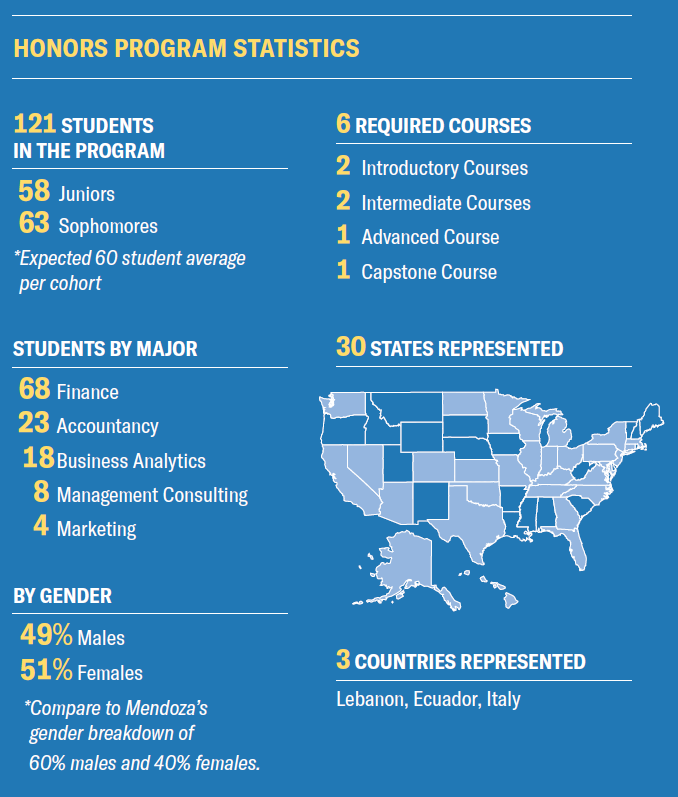 Earning a college degree can feel like a competition. Pitted against their peers, undergraduate students search for activities and programs to fill out their résumés in preparation to graduate and stand out in the job market. Honors programs can contribute to this cycle, pushing students to higher levels of achievement just for the credential.
Earning a college degree can feel like a competition. Pitted against their peers, undergraduate students search for activities and programs to fill out their résumés in preparation to graduate and stand out in the job market. Honors programs can contribute to this cycle, pushing students to higher levels of achievement just for the credential.
The Mendoza College of Business wanted something different. The College aspired to an honors program that identified top performing undergraduates who were seriously interested in the motto to “Grow the Good in Business” within a like-minded community. Instead of being another line on a résumé, the Business Honors Program is asking its students to consider what it means to study business at a Catholic institution.
“The Business Honors Program was designed as a departure from other kinds of honors programs,” said Jim Otteson, faculty director of the Business Honors Program and John T. Ryan Jr. Professor of Business Ethics. “While most other programs at business schools select students based on academic achievement, we decided to look at that, but also, in keeping with the identity, purpose and nature of the University of Notre Dame, look at character."
As the student profiles in this story attest, the Business Honors Program (BHP) is already shaping students’ view of the purpose of business.
Photos by Barbara Johnston.
Victoria Lyczak
Management Consulting and Theology Majors
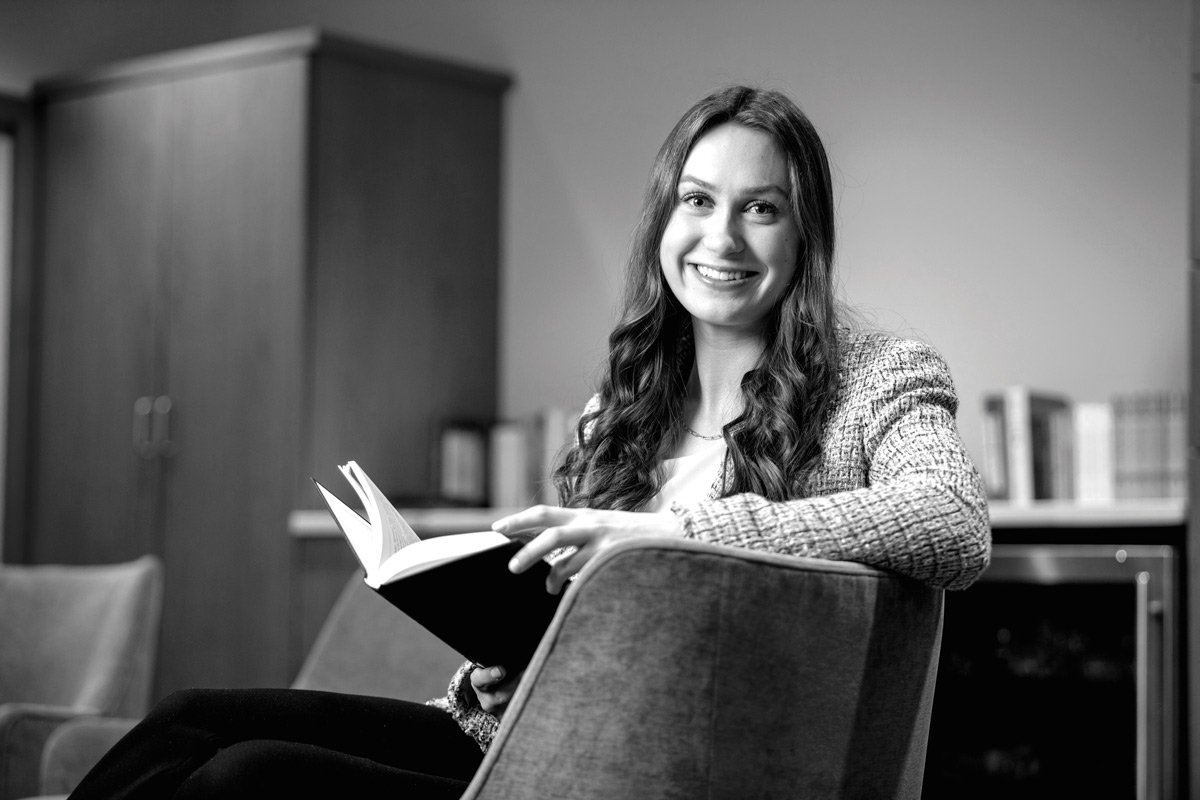 Victoria Lyczak (BBA ‘24) stumbled into the Business Honors Program (BHP) when her mom texted her to come to a tailgate. She was then introduced to Craig Iffland, BHP program director.
Victoria Lyczak (BBA ‘24) stumbled into the Business Honors Program (BHP) when her mom texted her to come to a tailgate. She was then introduced to Craig Iffland, BHP program director.
“Professor Iffland said, ‘So you’re interested in the Business Honors Program?’ and I said, ‘Sure!,’ when I literally didn’t know what it was.”
That conversation would kick off Lyczak’s journey into the program and change the trajectory of her future.
As a part of the BHP, students are required to take certain classes including an advanced course within their major. The course Lyczak chose was Research Methods in Management, which happened to be a part of Mendoza’s newly launched Ph.D. in Management program. Professor Otteson and Iffland encouraged her to try it. So she reached out to Jason Colquitt, Director of the Ph.D. in Management, to see if she could add it to her schedule.
“I knew it would be challenging and a lot of work being the only undergraduate student in a class with four Ph.D. students, but the description truly interested me, so I gave it a go,” said Lyczak.
She went in understanding the course would be a huge time commitment, requiring careful attention to make sure she grasped the course concepts. But Colquitt and the students took Lyczak under their wings, welcoming her and showing what it could look like being a Ph.D. student at the University of Notre Dame.
“I remember on the first day when the Ph.D. students and Professor Colquitt asked me if I was thinking about getting my Ph.D.,” said Lyczak. “At the time, I had not really considered it but that course revealed a whole new realm of possibility.”
Now, Lyczak is planning to pursue a Ph.D. in Management. She has continued down this path by looking into a research project with a Mendoza faculty member in the areas of ethics and leadership — topics that have interested her long before coming to college. The incorporation of ethics in her education was actually one of the reasons she chose Notre Dame over other institutions.
“I knew both ethics and business for the common good was going to be focused on in our classes at Mendoza. I felt like that was a piece that was missing at other colleges,” she said.
Through the BHP, she’s been able to work at the intersection of theology and business, applying Catholic social teaching. In ways she never imagined, stumbling into the BHP tailgate has helped Lyczak find a way to pursue all her passions.
“Through a second conversation with Professor Iffland, I realized being in the BHP was exactly what I wanted. It aligned so well with what I was trying to create for myself with my two majors. It made so much sense,” said Lyczak. “Sometimes I feel like God just leads you to things and even if you have other plans, maybe He has plans for you.”
Joshua Haskell
Accountancy Major
Joshua Haskell’s (BBA ‘24) first conversation with the Business Honors Program (BHP) was a request to withdraw his application.
“I was nervous about the time commitment,” Haskell shared.
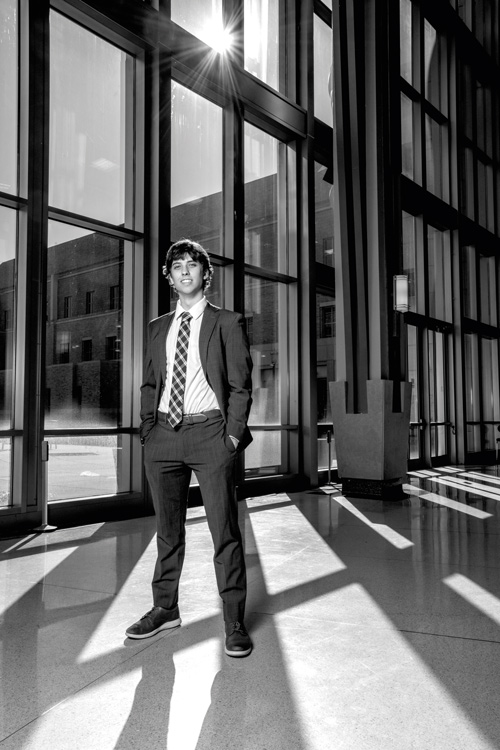 In response, BHP Faculty Director Jim Otteson invited Haskell to meet with him one on one. Haskell, skeptical, went.
In response, BHP Faculty Director Jim Otteson invited Haskell to meet with him one on one. Haskell, skeptical, went.
“I knew Professor Otteson was someone that probably shouldn’t have time to do that — to meet for an hour and a half just to talk about me, my goals and how they fit in with the program. It was a testament that the BHP was going to be student-focused where professors and staff were really willing to dive in and invest in the students.”
Joining the BHP has changed his college experience. All of his best friends are in the program, and he appreciates that the community is made up of like-minded students who believe in using their business knowledge for the good of the world. Because he grew up in a small community, he enjoys having a close-knit group that he can bond with throughout the academic year.
What surprised him, though, given that his mother’s career involved working with Catholic business leaders, was that some of his Notre Dame classmates had negative perceptions about business.
“For me, the vision of a business leader is to make a difference in the world. So much good can be done from business. I had this really isolated perspective where business is a good thing, and I learned that's not everyone else’s first experience.”
But that background gave him a unique view for his BHP classes, including Why Business? taught by Otteson. The course explores capitalism through a historical perspective, showing how different economic systems have evolved over time and how that’s resulted in innovation and the advancement of society.
One of the readings that really spoke to Haskell was an encyclical from Pope John Paul II Laborem Exercens, which was presented in 1981 as part of the larger body of Catholic social teaching. It discusses trends that would affect future generations such as the increased use of technology, the need to protect the environment and the growth of the global economy. But most notably, it emphasizes the dignity of work and the concept that “man is the subject of work,” not the object.
The concept emphasized that work is foremost for people and not toil, with the goal of finding the uplifting and fulfilling aspects of work. It was a moment that led to Haskell reframing his priorities in life and how he considers worth and success.
Altogether his classes, the BHP’s colloquia and other programming has made Haskell rethink his original desired career path, which was centered around prestige and the chase of success. Now, he wants to make sure his priorities stay aligned where God and others come first and embrace a career that is first for service. It means his future plans are, for now, undecided.
In the program’s inaugural year, Haskell received the BHP’s Spirit Award, which recognizes a student that most embodies the meaning of the program.
“It was a tough realization because I have this craving to be the ‘best,’ so I’ve had to redefine ‘best’ to not be like what everyone else thinks. I’ve redefined it to mean using my skills in a way that loves and serves others around me and society at large.”
Ryann McTague
Business Analytics and Psychology Majors
The meaning of “honorable business” has completely changed for Ryann McTague (BBA ‘25).
Before joining the second cohort of the Business Honors Program (BHP), she thought she understood the concept. But that changed after she took the course Theology and the Noble Vocation of Business with John Sikorski, assistant teaching professor of Business, Ethics and Society at Mendoza.
“That was my first BHP class. I probably think about the readings from that class every single day.”
Before the class, McTague thought that ethical and honorable business were the same, and that not committing fraud was the extent of it. But the idea that it takes more than being ethical and that honorable business means to add value to people’s lives through business struck her hard.
McTague would share their readings from class to her friends at Notre Dame and other universities. And to this day, a semester after the class ended, she still finds herself talking about it to people, unsolicited.
She wasn’t always this enthusiastic about the program. At first, she wasn’t quite sure if the BHP would be the right fit, but was interested in an academic challenge. It took several of her older peers to encourage her to apply. Those juniors, however, weren’t in her cohort.
“We started out as a random group of sophomores, not knowing how this was all going to turn out. Now, we pride ourselves on knowing one another by name and our ability to have really meaningful conversations together,” said McTague.
Part of that was made possible by the BHP exposing students to one another in so many different environments. From the classroom to lunches and dinners, volunteer activities to formal dances, students can build connections that will last long term. BHP calls this, Honors 911.
Created by BHP Faculty Director Jim Otteson, Honors 911 is a truly distinctive aspect of the program that calls on students to be available at any time of day if their fellow honors students are in need. By being in the program, students are committed to picking up the phone and answering 24/7. It's all about being there for a community that has come together for the same goal.
“What I’ve learned in the BHP is that it's more than a theory that business can be honorable. It’s taking it upon ourselves to go into business and making it a more honorable and ethical place.”
Sylvia Garcia
Accountancy and Economics Majors and Latino Studies Minor
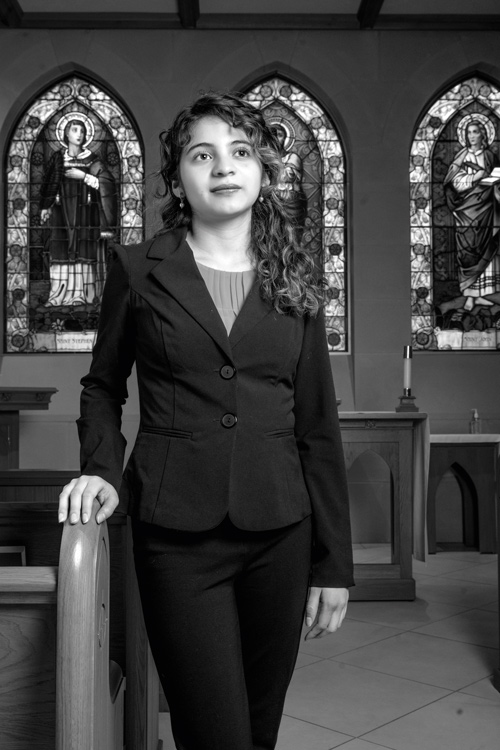 The Business Honors Program (BHP) positions itself as a student-driven community. For Sylvia Garcia (BBA ‘24), this was a big draw of the program. She saw it as an opportunity to meet more of her fellow business classmates.
The Business Honors Program (BHP) positions itself as a student-driven community. For Sylvia Garcia (BBA ‘24), this was a big draw of the program. She saw it as an opportunity to meet more of her fellow business classmates.
But what surprised her was the program’s emphasis on Catholic social teaching. Although she knew Notre Dame was a Catholic institution (because it was a significant reason for choosing the University), Garcia hadn’t considered how those two different pieces – business and her faith – would come together.
“My faith is really important to me. So being in an honors program that puts God at the center and asks us to consider how faith fits into your business career — that was something I didn’t realize I needed to hear.”
As someone very much engaged with her Catholic faith, she really values the BHP’s weekly Masses and the dinners that follow. The program’s courses, such as Theology and the Noble Vocation of Business and regular colloquia, play a large role in bringing faith to the forefront of her education.
One moment that has stuck with her was when Harry Kemp, senior vice president at Lear Corporation, discussed during a colloquium his experience discerning between two job offers. Kemp shared how he would go to holy hour regularly to help him decide.
“He relied on faith to determine which job would help him do his best work and which would allow him to do the most good,” said Garcia. “It was a reminder for me how my faith and my career are not two separate worlds. They should go together.”
Garcia developed a love of accountancy from her mother, who studied accountancy in Mexico before immigrating to San Antonio with her husband. Now, Garcia is happy to be studying the same field at Notre Dame, involved in Coro Primavera, the University’s Spanish choir at the Basilica, and learning how to keep her faith and career entwined through the BHP.
Kevin Wang
Finance and Applied & Computational Mathematics & Statistics Majors; Business Technology Minor
Piloting Mendoza’s first class of the Business Honors Program (BHP) is an interesting position to be in, said Kevin Wang (BBA ‘24).
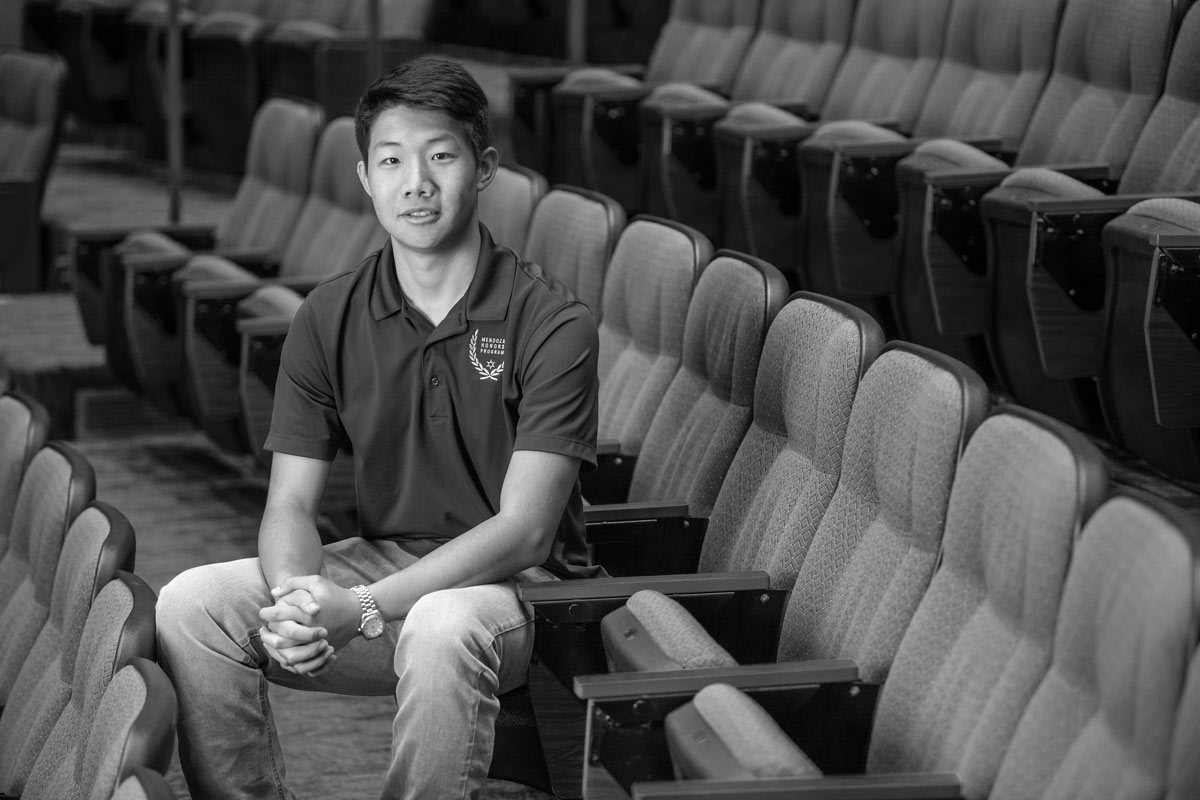 “I appreciate being able to influence the future of the program and help guide where it's headed.”
“I appreciate being able to influence the future of the program and help guide where it's headed.”
Wang is no stranger to facing challenges head on. He originally chose Notre Dame because they were one of few universities continuing to meet in person during the pandemic. He wanted a more normal college experience that included clubs, meeting new people and getting involved around campus.
BHP was one of the ways that Wang thought could help him meet students at Mendoza. At first, he wasn’t quite sure what to expect because it was so new. He found that BHP prioritized giving students an opportunity to shape how the program will look.
“Everything so far has been student focused. It's clear that the BHP directors and staff want a strong community aspect to the program and so the students have been really invested in that as well.”
Beyond the multiple academic elements, BHP hosts several non-required social events to support the student community. For example, the program organized a formal ball as a kind of replacement prom since many college students missed out during their high school years due to the pandemic. The students also are encouraged to come up with their own event ideas and to help lead those organization efforts in the program.
Before joining the BHP, Wang’s goal was to find a career at the intersection of finance and tech. That goal hasn’t changed for him, but now he is thinking more critically about how he does that while making sure that career path is truly beneficial to society. He has a clearer vision for a future career path that includes contributing to the common good, and he’s grateful to be a part of a community of like-minded students that understands that belief.
“That’s been the most defining part of the BHP; it’s undoubtedly changed my experience at Notre Dame for the better.”
Justin Caccavo
Finance and Theology Majors
Being a force for good is really important to Justin Caccavo (BBA ‘25) – and it shows.
He’s on “The Shirt” committee, raising money for students with unexpected medical expenses. He traveled to Appalachia for a service project over fall break. And last spring, he volunteered with local shelter Hope Ministries to babysit for homeless families.
So it's no surprise that the mission of the Business Honors Program (BHP) reeled him in.
“At first, I thought it would just be an advanced course load, to be honest. But it’s so much more than that,” said Caccavo. “Everyone in BHP takes ‘Grow the Good in Business’ seriously.”
Before coming to Notre Dame, Caccavo completed an internship at Hudson Bay Capital, which confirmed his interest in the finance industry. But after starting college, Caccavo realized there sometimes was a stigma of greed or selfishness associated with being a finance major. Joining BHP, taking the required courses, and hearing from guest speakers at the colloquia helped him conceptualize how he could use business in a way that helps others. Now, Caccavo is fully on board.
“It’s so important to believe in what you’re doing and know you’re on the right path in life. BHP is helping with that. It helped me see that finance can be a really good way to help people and contribute to society.”
A big part of that self-discovery resulted from Caccavo’s relationship with BHP mentor Rich Meyer (MSM ‘22). The BHP mentorship program is unique in its goal. Unlike other programs that focus on helping students through an interview process or find a job, BHP mentors. help students develop a fully integrated life, spiritually and professionally, assisting with a broad range of concerns from mental health to personal issues.
For Caccavo, this means bringing his “whole” person to the office every day and not checking his Catholic faith at the door.
“As a finance and theology double major, it has been really cool to bring both together and consider big questions like ‘Why are we taking business seriously as if a vocation from God?’” he said.
As for his career trajectory, Caccavo originally was only considering the first steps of his career. But after taking BHP courses and working with his mentor, he has begun to look 10, 20 and 30 years down the road. He's hoping to pursue a path to a leadership position; something that allows him to offer goods or services that tangibly benefit society.
Wherever he ends up, he wants to make sure he’s not just earning a living, but contributing to the greater good of the world.
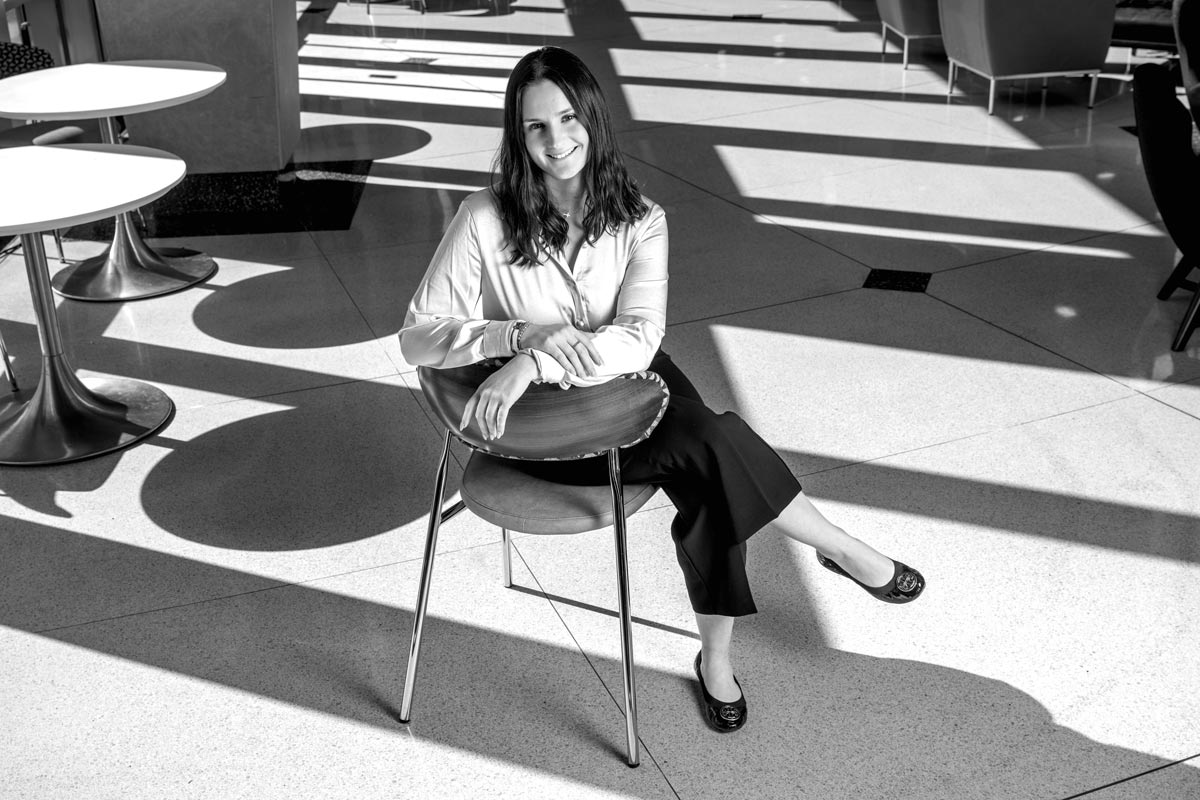
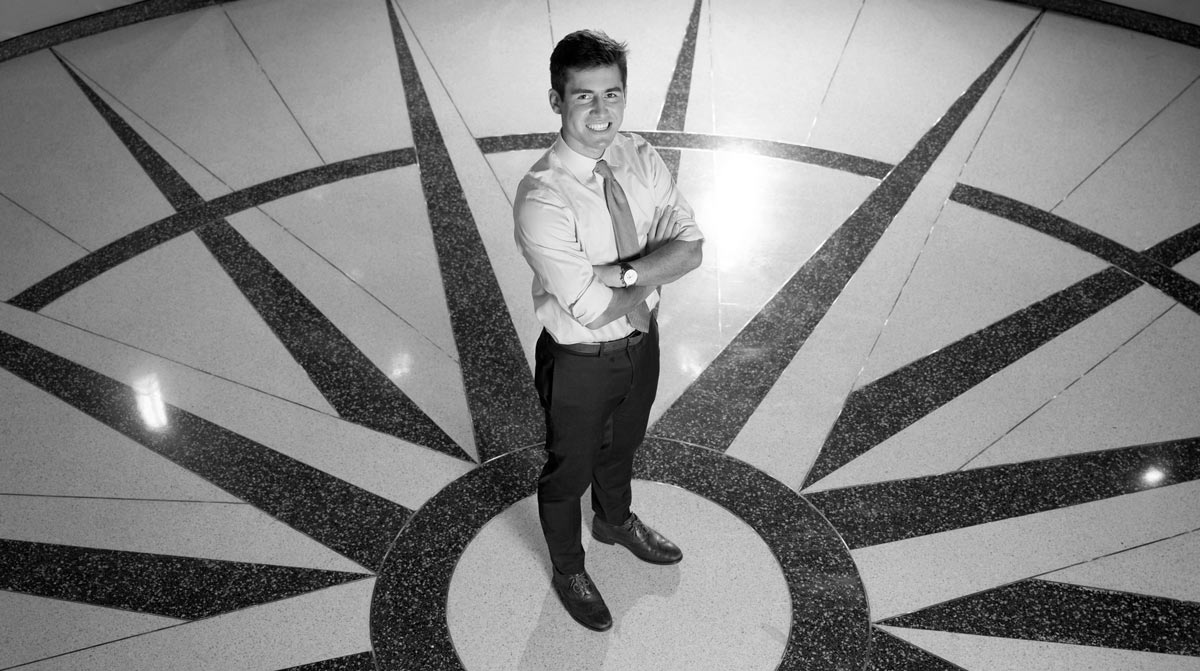

Comments